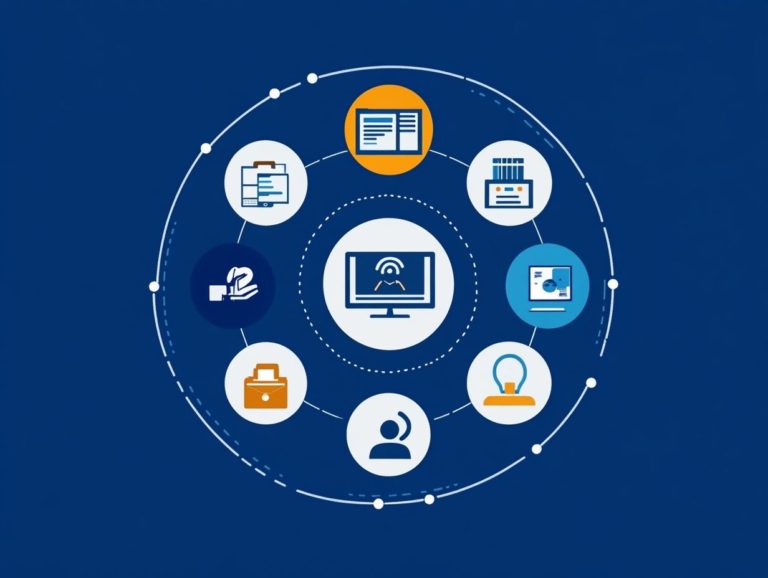The Rise of AI in CRM Integrations
In today’s fast-paced business environment, you ll find that CRM systems are more crucial than ever, particularly when paired with cutting-edge technologies.
This article delves into the transformative power of AI within CRM integrations, outlining their definitions, purposes, and the substantial benefits they offer.
While the advancements are certainly promising, it s important to address the challenges that come with them, including privacy and security concerns.
With real-world case studies and practical implementation advice, you ll gain a comprehensive understanding of the future of CRM.
Dive in to discover how you can transform your business by leveraging these technologies to enhance customer engagement and drive success.
Contents
- Key Takeaways:
- Understanding CRM Integrations
- The Impact of AI on CRM Integrations
- Challenges and Limitations of AI in CRM Integrations
- Successful Examples of AI-powered CRM Integrations
- How to Implement AI in CRM Integrations
- The Future of AI in CRM Integrations
- Preguntas Frecuentes
- Qu se entiende por IA en las Integraciones de CRM?
- C mo se est integrando la IA en los sistemas de CRM?
- Cu les son los beneficios de usar IA en las Integraciones de CRM?
- Existen desaf os asociados con el aumento de la IA en las Integraciones de CRM?
- Puede la IA reemplazar completamente las interacciones humanas en CRM?
- C mo impactar el aumento de la IA en el futuro del CRM?
Key Takeaways:
- AI is revolutionizing CRM by improving efficiency and accuracy.
- Implementing AI requires addressing privacy concerns and following best practices.
- Exciting developments like predictive analytics and virtual assistants are on the horizon.

Understanding CRM Integrations
Understanding CRM integrations is essential if you re aiming to elevate your CRM systems with effective technology solutions.
These integrations empower your organization to streamline operations and cultivate meaningful customer engagement experiences.
Furthermore, they harness data for superior decision-making. CRM integrations enhance communication among your sales, marketing, and customer service teams, ultimately elevating your conversion rates and minimizing customer churn.
By connecting various tools and platforms, you can create a cohesive ecosystem that supports AI-powered personalization and efficient product recommendations.
This lays the groundwork for increased customer loyalty and business success.
Definition and Purpose
The essence and aim of CRM integrations center around establishing a cohesive platform that enriches customer engagement and streamlines business processes.
This integrated system acts as a central hub for customer data, facilitating seamless communication and interactions across various departments.
For instance, your sales teams can harness CRM to effectively track leads and nurture relationships, while marketing can personalize campaigns tailored to customer behavior.
Service teams gain significant advantages from CRM integrations, accessing comprehensive customer histories that empower them to resolve issues swiftly and efficiently.
In sectors like retail and real estate, these CRM tools are critical for grasping consumer preferences and trends, enabling the development of tailored strategies that cultivate loyalty and drive sales.
The Impact of AI on CRM Integrations
The impact of AI in CRM software integrations is nothing short of transformative. As you harness AI-powered technologies, you enhance customer engagement and streamline your processes in remarkable ways.
By leveraging AI, your organization can implement predictive analytics the ability to predict future customer behavior based on past data to anticipate needs and refine marketing strategies.
Data-driven decisions significantly boost conversion rates. Integrating AI models provides you with a competitive edge, delivering personalized experiences that truly resonate with your customers.
This approach leads to higher ROI and fosters long-term customer loyalty.
Benefits and Advancements
The integration of AI into CRM systems revolutionizes your approach to sales optimization and customer relationships.
This integration empowers you to leverage predictive analytics, providing your sales team with actionable insights that help identify potential leads and prioritize follow-ups efficiently.
By scrutinizing customer behaviors and preferences, AI-driven CRM solutions uncover trends that enable you to craft personalized marketing strategies.
As a result, you can streamline your marketing efforts and enhance the overall customer experience.
Expect increased sales and a deeper understanding of your customer base, ultimately cultivating loyalty and long-term success in today s fiercely competitive marketplace.
Challenges and Limitations of AI in CRM Integrations

While the potential of AI in CRM integrations is undeniably vast, it’s crucial to recognize and address the various challenges and limitations that accompany effective implementation.
Key issues, such as privacy concerns and ethical considerations, can obstruct the successful execution of AI technologies. You must make AI clear and understandable to cultivate trust, ensuring that your AI-driven customer engagement practices uphold data integrity and safeguard customer privacy.
Addressing Privacy and Security Concerns
Addressing privacy and security concerns is critical when integrating AI into your CRM systems. Implementing robust strategies that prioritize data protection helps mitigate the risks associated with artificial intelligence applications.
This means adhering to established regulatory frameworks like the General Data Protection Regulation (GDPR) and the California Consumer Privacy Act (CCPA). It also involves fostering a culture within your organization that emphasizes ethical practices.
Utilizing techniques like removing personal details to protect privacy, obtaining informed consent, and conducting regular audits will help ensure compliance and accountability.
By establishing clear protocols for data access and usage, you empower your business to build trust with customers while promoting responsible AI adoption.
Successful Examples of AI-powered CRM Integrations
Successful examples of AI-powered CRM integrations provide valuable insights into how technology can enhance customer service and engagement.
Companies like Salesforce and Appinventiv harness AI-driven solutions that analyze customer data to deliver tailored product recommendations and personalized marketing campaigns. These exciting case studies show how smart CRM integrations can truly elevate customer engagement!
They illustrate how intelligent CRM integrations can drive higher conversion rates and ultimately boost your business profitability.
Case Studies and Results
Examining various case studies reveals the impressive ROI achievable through effective AI-powered CRM integrations. Take, for instance, a leading retail company that adopted an AI-driven CRM system.
This move not only streamlined customer interactions but also enhanced data analysis capabilities, resulting in a remarkable 30% increase in customer satisfaction scores within just six months.
By embracing this transformative approach, the organization could anticipate customer needs and personalize recommendations, leading to a significant boost in sales.
In the telecommunications sector, a compelling example showcases how AI tools facilitated real-time support, cutting response times by 50% and fostering stronger customer loyalty.
These tangible improvements highlight the crucial role AI plays in modern customer engagement strategies. Remember, integrating such technologies can elevate your business to new heights.
How to Implement AI in CRM Integrations
Implementing AI in your CRM integrations is essential for staying competitive in today s market! It requires a strategic approach grounded in best practices and thoughtful consideration of your unique business use cases.
Begin with customer segmentation to ensure that your AI applications are finely tuned to the specific needs and preferences of different customer groups. By leveraging insights from data analytics and aligning your AI solutions with broader marketing campaigns, you can elevate your operations and enhance customer experiences.
Best Practices and Considerations

Following best practices is vital for successfully implementing AI in CRM integrations, ensuring optimal customer engagement. This involves a comprehensive approach where meticulous planning serves as the foundation for AI solutions specifically designed to meet your organizational needs.
- Ongoing training is essential; it equips your teams with the skills necessary to navigate AI tools effectively.
- Integrating customer feedback is vital for refining AI applications, enabling your organization to adapt and improve continuously.
By prioritizing these elements, you can create a robust framework that not only enhances productivity but also enriches the overall customer experience.
In summary, remember that protecting customer data isn’t just good practice; it’s key to building lasting relationships!
Start integrating AI into your CRM systems today for maximum impact!
The Future of AI in CRM Integrations
The future of AI in CRM integrations holds remarkable promise. Emerging trends, particularly the role of AI in CRM best practices, are set to transform how businesses connect with customers and streamline operations.
As technology progresses, organizations are increasingly leveraging AI to elevate customer engagement. This drives efficiencies that result in higher ROI.
Future trends indicate a heightened focus on ethical AI practices. It’s essential to manage customer data with transparency and respect while delivering personalized experiences that truly resonate with your target audience.
What to Expect from AI in CRM
Predictions regarding AI in CRM integrations suggest a future where customer engagement becomes increasingly personalized and intuitive.
This evolution gives you the power to leverage advanced analytics and machine learning a type of technology that helps computers learn from data to make better decisions enabling you to customize interactions based on individual preferences and behaviors.
Enhanced data processing capabilities allow your business to anticipate customer needs with remarkable accuracy. This transforms ordinary engagements into truly delightful experiences.
As AI technologies become more seamlessly integrated within your CRM systems, get ready to streamline your operations and boost efficiency! You can automate routine tasks and ultimately cultivate stronger relationships with your clients.
By embracing these innovations, you enhance your competitive edge while delivering superior value to your customers in an ever-evolving marketplace.
Preguntas Frecuentes
Qu se entiende por IA en las Integraciones de CRM?
La IA en las Integraciones de CRM se refiere al uso de tecnolog a de inteligencia artificial (IA) en sistemas de gesti n de relaciones con clientes (CRM). Esto implica incorporar capacidades de IA, como el aprendizaje autom tico y el procesamiento de lenguaje natural, en plataformas de CRM para mejorar su funcionalidad y la experiencia general del cliente.
C mo se est integrando la IA en los sistemas de CRM?

La IA se est integrando en los sistemas de CRM de diversas maneras. Se utilizan chatbots para servicio al cliente, an lisis predictivo para pron sticos de ventas y an lisis de sentimientos para comprender el comportamiento del cliente.
Tambi n se puede utilizar para automatizar tareas rutinarias, personalizar interacciones con los clientes y proporcionar informaci n en tiempo real para apoyar la toma de decisiones.
Cu les son los beneficios de usar IA en las Integraciones de CRM?
- Aumento de la eficiencia y productividad.
- Mejor experiencia del cliente.
- An lisis de datos e informaci n m s precisos.
- Mejor toma de decisiones.
- Ventaja competitiva al identificar nuevas oportunidades.
Existen desaf os asociados con el aumento de la IA en las Integraciones de CRM?
Si bien el aumento de la IA en las Integraciones de CRM presenta muchas oportunidades, tambi n hay desaf os a considerar. Estos pueden incluir el costo inicial de implementar la tecnolog a de IA y la integraci n con sistemas existentes.
Preocupaciones sobre la privacidad de los datos y la necesidad de capacitaci n continua son cr ticas para garantizar un uso efectivo de las capacidades de IA.
Puede la IA reemplazar completamente las interacciones humanas en CRM?
No, la IA no est destinada a reemplazar completamente las interacciones humanas en CRM. Puede manejar ciertas tareas e interacciones, como responder a consultas b sicas de los clientes, pero no puede replicar las complejidades de las emociones y relaciones humanas.
El enfoque m s efectivo es combinar las capacidades de IA con el conocimiento y las habilidades humanas para ofrecer la mejor experiencia posible al cliente.
C mo impactar el aumento de la IA en el futuro del CRM?
Se espera que el aumento de la IA en las Integraciones de CRM tenga un impacto significativo en el futuro del CRM. Esto probablemente conducir a experiencias de cliente m s personalizadas y fluidas, as como a una mayor eficiencia y productividad.
Tambi n puede provocar cambios en los roles y responsabilidades de los equipos de ventas y servicio al cliente, a medida que la IA asuma algunas de sus tareas tradicionales.
Discover how AI can transform your CRM strategy today!






